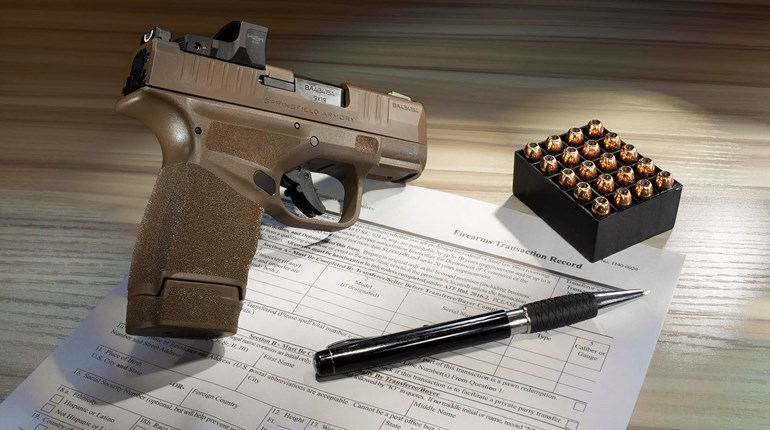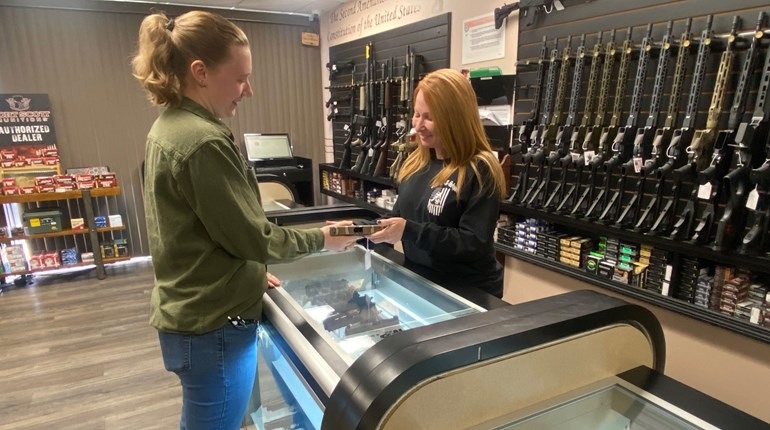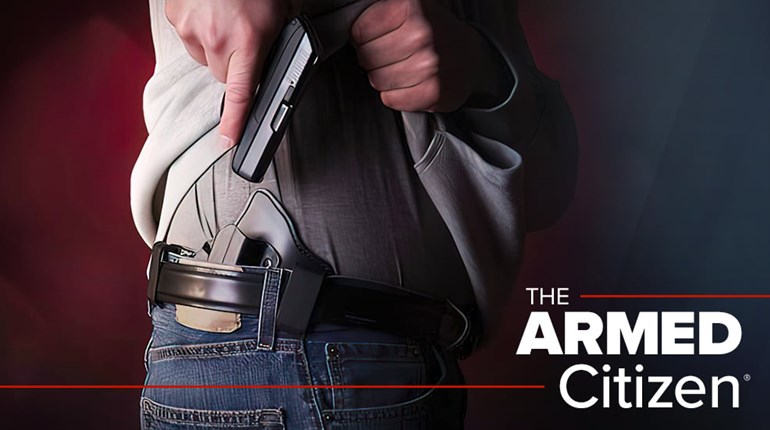
With President Joe Biden (D) constantly blaming firearms manufacturers and gun stores for arming criminals, though even federal data shows that the vast majority of criminals get their guns by stealing them or otherwise breaking laws to get them, we knew it was time to talk to the industry’s trade association, the National Shooting Sports Foundation (NSSF), about new and ongoing attempts to disparage and vilify gun manufacturers and stores.
We reached out to Lawrence G. Keane, senior vice president for government and public affairs for the NSSF. As its lead attorney, Keane is involved in a lot of litigation and legislation related to the firearms industry. The NSSF, often alongside the NRA, is involved in every Second Amendment-related issue that involves the NSSF’s members.
And there are a lot of fronts in this war on our Second Amendment rights at present.
A1F: In his State of the Union address, President Biden claimed that firearms manufacturers have an immunity which, he said, “Makes gun manufacturers the only industry in America that can’t be sued—the only one.” The suggestion being that gun makers have a special protection or exemption from the nation’s laws compared to other American businesses.
Keane: Biden made those claims about firearms manufacturers having a special legal immunity going back to the presidential primaries in 2020, and those claims have been fact checked again and again—and given numerous “Pinocchios” by media that includes The Washington Post, PolitiFact and CNN, all of which are hardly conservative media outlets—yet Biden repeats this incorrect claim again and again.
And that is called a lie.
That may sound harsh. Now, if he had said this once, got fact checked and was shown to be wrong and then either admitted he was wrong or at least didn’t repeat the claim, then okay, that’s a mistake. But by repeating this false claim again and again, Biden is purposefully and knowingly lying to the American public.
A1F: But a federal law known as the Protection of Lawful Commerce in Arms Act (PLCAA) does give the firearms industry certain legal protection, doesn’t it.
Keane: American law has never imposed penalties on manufacturers for the criminal misuse of their products, which was why the PLCAA was passed by a wide bipartisan margin. What happened was big-city mayors and other gun controllers in the late 1990s and early 2000s were trying to legally blame firearms manufacturers, distributors and retailers for the criminal misuse of firearms by third parties. Those third parties, by the way, are known as criminals.
The PLCAA stops these frivolous lawsuits against gun manufacturers by prohibiting lawsuits against gun makers for criminal acts committed by others.
The federal PLCAA began on the state level, with various states like Louisiana and Texas re-working their tort-reform laws because of lawsuits by various municipalities suing gun makers under public-nuisance theories. Eventually, Congress took up this issue and the result was the PLCAA. Which, by the way, does not stop gun makers from being sued for defective products. But the PLCAA does stop lawsuits based on the criminal misuse of those products by others.
The example often used is when a drunk driver kills someone while driving his or her personal vehicle, do you sue the car maker or the drunk for that death? The answer is obvious.
A1F: The mainstream media made a big deal of the Remington-Sandy Hook lawsuit being settled. Stories kept claiming that Remington had settled the lawsuit, trying to suggest that a gun maker had taken legal responsibility for the criminal misuse of its products. But that reporting was very misleading, correct?
Keane: It was incorrect on many levels. First of all, “Remington” as such, does not even exist. Originally, it was the Remington Outdoor Company (ROC) that was sued on the argument that Bushmaster, an ROC-owned company at the time, had made and advertised the rifle used in the Sandy Hook tragedy; however, ROC went into bankruptcy a couple of years ago and its assets were sold off.
Now, there were insurance policies in place when the lawsuits were first filed and when ROC declared bankruptcy. The insurance companies involved decided to settle the lawsuits. But there was never a CEO at Remington who said, “Settle this case.”
A1F: In the U.S. House of Representatives, H.R. 6970, the Firearm Industry Nondiscrimination (FIND) Act, was introduced by Rep. Jack Bergman (-Mich.). The FIND Act would prohibit corporate entities from profiting from taxpayer-funded federal contracts while discriminating against the shooting-sports industry. Is the discrimination really such that a federal law is required?
Keane: This legislation is critical to ensuring “woke” corporations don’t use their financial might, funded by taxpayers, to deny essential services to the firearm industry. Corporations, particularly financial institutions, have been dictating public policies from boardrooms that throttle firearm businesses, which are constitutionally protected. This bill will no longer allow those corporations to benefit from taxpayer dollars while at the same time using those funds to deny Americans their Second Amendment rights.
A1F: Can you give us some examples of this discrimination at work?
Keane: Many banks and other financial-service providers have been discriminating against the firearms industry for years now. Citigroup, for example, has had a policy in place since 2018 that they won’t provide loans and other financial services to any FFLs [Federal Firearms Licensees] that sell long guns to people under 21 or if these businesses sell so-called high-capacity magazines. Bank of America has a policy of not providing services to retailers that sell AR-style rifles, while Wells Fargo and Capital One also won’t provide credit and financial services to most gun makers and retailers.
That’s discrimination against legal and law-abiding businesses, and it’s not up to banks to tell lawful businesses how they should operate.
What the FIND act would do is say, yes, you can discriminate against the firearms industry if you want. In this sense, it is a free-market bill. But if you do discriminate, you will not be able to benefit from American-taxpayer-provided resources like the FDIC [the Federal Deposit Insurance Corporation, which insures deposits in American banks up to $250,000.] There are many other benefits these banks receive from the taxpayers—citizens who have Second Amendment rights.
This would also apply to other financial-service providers, like PayPal and point-of-sale processing services, many of which have actively discriminated against retailers in our industry.
A1F: A number of states have put in place similar types of laws, correct?
Keane: Yes. Texas, for example, signed a bill similar to the FIND Act into state law, and a number of other states have pending bills as this is being written.
In Texas, large banks have been underwriting municipal bonds. Now, they have to certify that they do not have a pattern of discrimination before they can underwrite these bonds. A number of these banks simply can’t provide that certification because they do, in fact, have such discriminatory policies, and in many cases, they have been very public about discriminating against our industry.
This Texas law has cost these banks a good deal of money, and we hope these banks will consider revising their policies.
A1F: Last December, 14 firearm manufacturers, distributors and retailers, plus the NSSF, filed a lawsuit and moved for a preliminary injunction in U.S. District Court for the Northern District of New York challenging a 2021 New York law. Specifically, the lawsuit argues that a New York law, passed in July 2021, is unconstitutional because it allows lawsuits against gun makers under the “public-nuisance” theory when guns are used in crimes. Where does NSSF stand on this suit and how is the case proceeding?
Keane: That New York law would subject members of the firearm industry to civil lawsuits for the criminal misuse or unlawful possession of firearms in New York. The law would impose liability on industry members for firearms lawfully sold anywhere in the United States that end up being criminally misused or illegally possessed in New York, thereby allegedly contributing to a “public nuisance” in the state.
The NSSF filed a request for a preliminary injunction against the law until the case can be heard. I believe the New York attorney general gets one more chance to request that the lawsuit be dismissed, but we don’t believe a dismissal will occur.
But if the court grants the preliminary injunction, as we suspect it will, I would then expect the Federal Second Circuit Court to begin hearing the case later this year. The New York law and public-nuisance theory fly in the face of the PLCAA and we believe the law should and will be struck down.


































